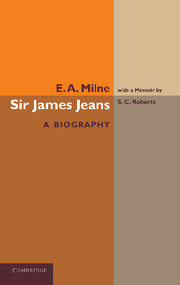Book contents
- Frontmatter
- PUBLISHERS' NOTE
- Contents
- MEMOIR
- I Merchant Taylors' and Cambridge
- II Princeton, 1905–9
- III Return to England. The Adams Prize Essay, 1909–19
- IV Secretary of the Royal Society, 1919–29
- V Popular Exposition, 1929–30
- VI Later Years, 1931–46
- VII Science in Jeans's Boyhood
- VIII The Partition of Energy
- IX Rotating Fluid Masses
- X Star Clusters
- XI The Equilibrium of the Stars
- XII Jeans and Philosophy
- Bibliography
- Index
III - Return to England. The Adams Prize Essay, 1909–19
Published online by Cambridge University Press: 05 June 2016
- Frontmatter
- PUBLISHERS' NOTE
- Contents
- MEMOIR
- I Merchant Taylors' and Cambridge
- II Princeton, 1905–9
- III Return to England. The Adams Prize Essay, 1909–19
- IV Secretary of the Royal Society, 1919–29
- V Popular Exposition, 1929–30
- VI Later Years, 1931–46
- VII Science in Jeans's Boyhood
- VIII The Partition of Energy
- IX Rotating Fluid Masses
- X Star Clusters
- XI The Equilibrium of the Stars
- XII Jeans and Philosophy
- Bibliography
- Index
Summary
SHORTLY after his return to England, Jeans was appointed Stokes Lecturer in Applied Mathematics in the University of Cambridge (1910). He retained this appointment till 1912, when he retired and went to live at Guildford, there devoting himself to mathematical research.
In 1914 Jeans published his justly famous Report on Radiation and the Quantum Theory for the Physical Society of London. As a result of the outbreak of war, it did not at first reach a large circle of readers, but it was eagerly read when students of mathematics and physics returned from the war in 1919; and it did much to establish confidence in the quantum theory and in Bohr's then entirely unorthodox theory of the atom and atomic spectra. Together with Eddington's Report on the Relativity Theory of Gravitation (1918), also made for the Physical Society of London, it decisively influenced the acceptance by responsible scientists of a new theory.
Jeans's Report consisted of seven chapters, of which the first was entitled ‘ Introductory: On the Need for a Quantum Theory’, and the last ‘On the Physical Basis of the Quantum Theory’. Of the other five chapters the first two summarized the substantial parts of Jeans's own researches in radiation according to the classical mechanics and the revolutionary modifications of that theory at the hands of Planck, and the remaining three dealt with Bohr's theory of the hydrogen and hydrogen-like atoms and their spectra, Einstein's theory of the photo-electric effect, and the theory of the specific heats of solids, due to Einstein, Debye and Lindemann. The whole Report amounts to ninety pages.
This was of course well before the days of quantum mechanics, and the theory was a collection of dynamical contradictions. At the end of his Report Jeans wrote:
…It may be asserted with confidence that until some kind of reconciliation can be effected between the demands of the quantum theory and those of the undulatory theory of light, the physical interpretation of the quantum theory is likely to remain in a very unsatisfactory state… the explanation of the black-body spectrum demands the quantum theory and nothing but the quantum theory, all the discontinuities of the theory and their surprising physical consequences included.
- Type
- Chapter
- Information
- Sir James JeansA Biography, pp. 17 - 31Publisher: Cambridge University PressPrint publication year: 2013



